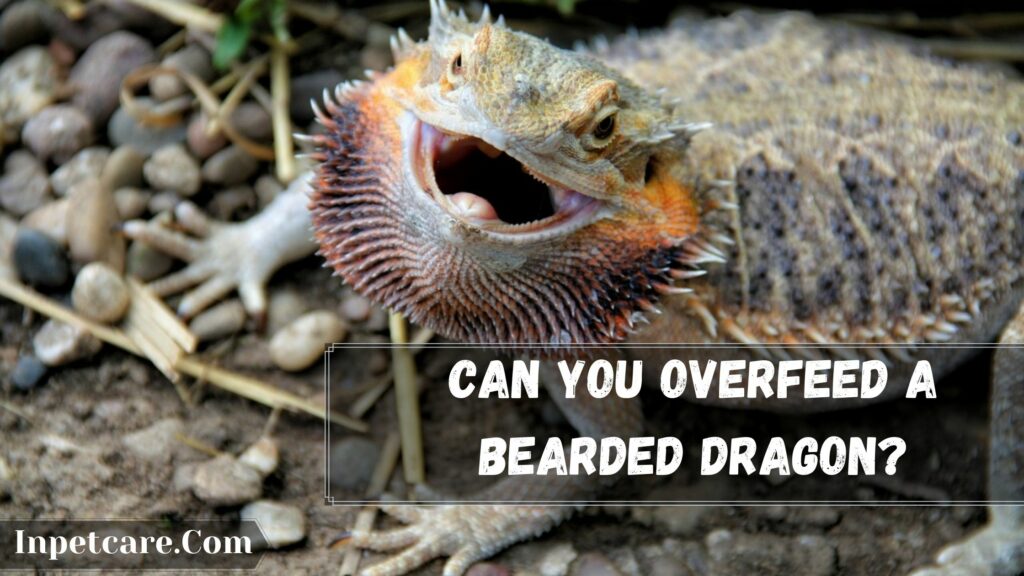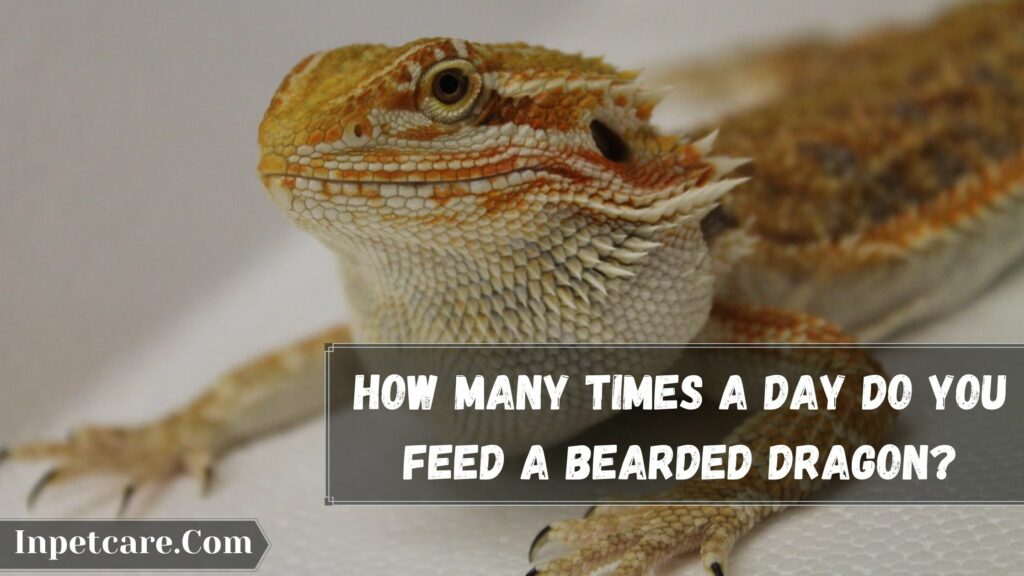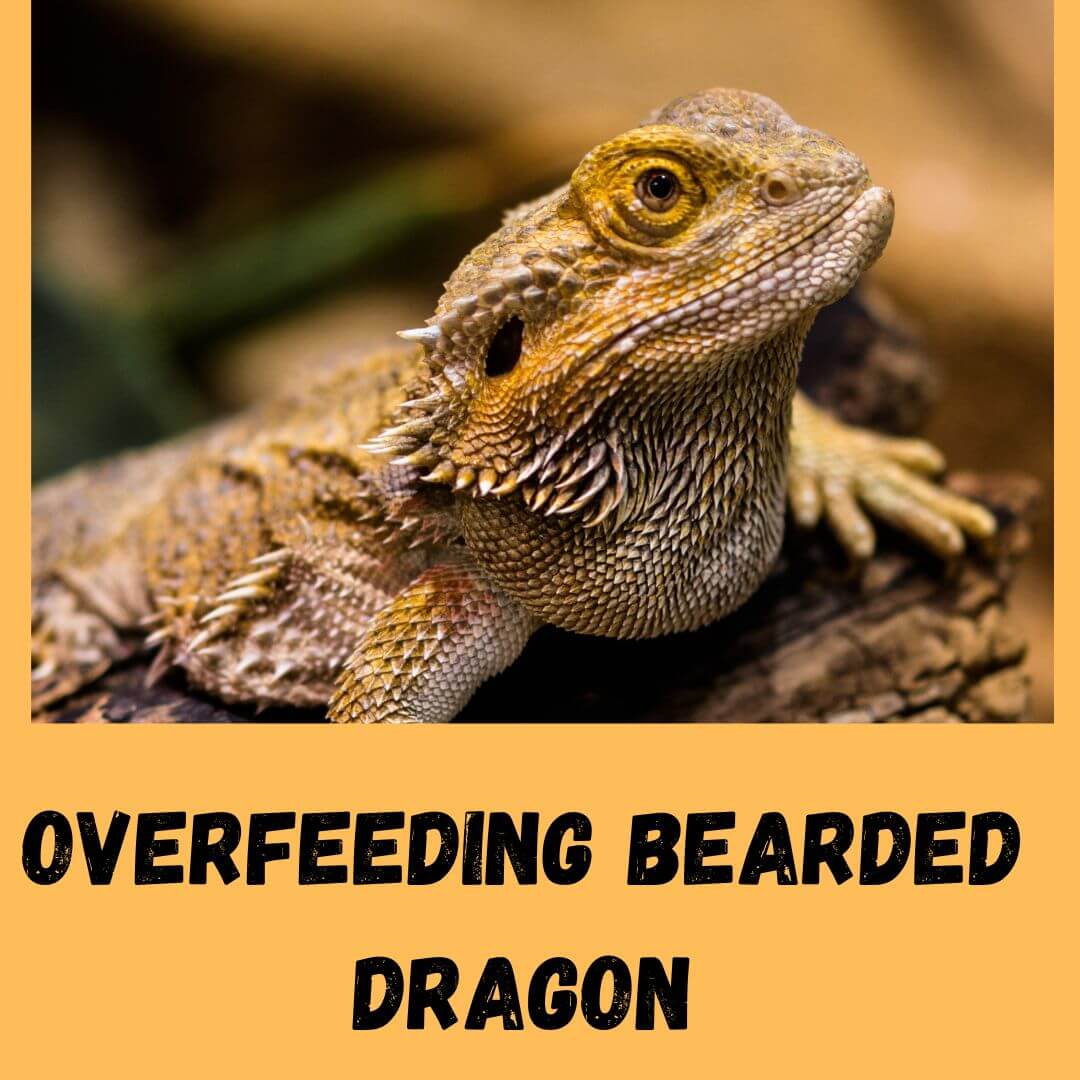Feeding your bearded Dragon a proper diet made up of leafy greens, fruits, and feeder insects is necessary for their wellbeing and health. But, the more important thing is the proper feeding schedule. Overfeeding a bearded dragon is possible if you keep them offering food without considering time or serving size.
An overweight bearded dragon is prone to many health problems while overall a shorter life span when compared to the healthy bearded Dragon.
Therefore, in this article, I am not only going to answer the fun question: can you overfeed a bearded dragon? But also how to know what to do if a dragon is overfed.
Overfeeding Your Bearded Dragon is not something you usually do on purpose. But, it is more common among new reptile owners who are just a little too keen to make sure their beardie is happy. Therefore, let’s first answer the question: can you overfeed a bearded dragon?
Can You Overfeed A Bearded Dragon?

Yes. You can overfeed a bearded dragon, and it is very much possible. This should always be avoided as overfeeding often results in unnecessary health problems. The most prominent sign of overfeeding in beardies are obesity in the walking, slow movement, belly rolls and armpit fat bubbles.
Overweight beardies are usually wider than their head with a very thick tail base. If you have been consistently feeding Your bearded Dragon without considering the schedule or the serving size, your pet will pick up the nasty habit and become obese.
It would likely become fatal over time. Hence, one can eat a lot whereas another one is not. Some bearded dragons tend to have bottomless stomachs. But it is still possible to overfeed them if you are not careful with how many insects you offer.
If you want to avoid that, then you must first look for the signs of you overfeeding your Dragon or not and do a couple of things to prevent it.
How Do You Know If You Overfeed Your Bearded Dragon?
If you have been feeding your bearded Dragon with lots of food, they will deposit fat in the tail to store excess energy when they brumate or the food is scarce. Hence, this type of adaptation is excellent for the wife, but it has some drawbacks in captivity.
A healthy bearded dragon needs to store some fat in the tail. But their tail shouldn’t look bulbous or mishappening. An overweight bearded dragon can start to develop fatty livers, which can cause serious health issues that will be debilitating.
At the point when a bearded dragon won’t be able to store any more fat in its tail, it will start depositing it throughout its body and organs. It’s a must to avoid overfeeding Your beardies if you want them to have a long healthy life.
No one will want their pet to end up getting fatty liver disease. There are many vital signs of obesity in bearded dragons, which you can look at regardless of their exact weight.
Signs Of Obese Beardies
- Sagging Belly
- Belly Rolls
- Armpit Fat Bubbles
- Thicker Tail Than Its Head
- Thick Tail With Heavy Base
- Lethargy
- Refuse To Hunt Insects
Suppose your bearded Dragon shows any of the signs in combination with lethargic behavior. In that case, there is a good chance that they are probably either overfed or fed with insects that are high in fat content, causing them to gain access weight at a fast rate.
Fortunately, it isn’t the end of the world because you can get it under control if you take the proper steps properly. Depending on how much your bearded Dragon is, it can take quite some time because he is used to eating more than usual, which needs to back down. Therefore, rather than being sad, let’s learn how much to feed a bearded dragon.
How Much Should I Be Feeding My Bearded Dragon?
As soon as your bearded Dragon reaches sexual maturity and adulthood, always get down to just two feeds each day. And that will be around 18 months of age. Their diet should always consist of 75% veggies, 5% fruits, and 20% live insects.
Determining how much to feed your beardies is simply effortless. Just let your beardie learn how much to eat by only offering a certain amount of food at each feeding. When you are feeding insects, allow them 10 minutes to hunt, eat them and see how many are left uneaten.
Vegetables and fruits will also work similarly. Offer a good amount of vegetables and fruits and see how much they eat at each feeding and how much is left uneaten. Leave their food in that enclosure for about 30 minutes.
Thirty minutes will be enough for your beardie to eat until they feel full while preventing overeating, and there are uneaten foods to remove. Permanently remove an eaten food, or it can cause mould issues.
The number of insects you offer to your beardie should be controlled. Always offer them a tiny insect because larger than the space of your beardie’s head will be too big for them to consume. For hatchlings, offer insects that are only 3/8 inch.
For juvenile beardies, offer an insect with the size of 1/4 inch. For adult beardies, go with the full-grown cricket. According to a good rule of thumb, two insects at a serving is enough for your beardies to benefit their health.
Also, take into account what type of insect you are feeding. Not all insects have the same nutrient density. If you have been feeding insects like wax worms that are high in fat, it could be why your beardie is gaining excessive weight.
The good insects for beardies to eat are cricket, Dubia roaches and mealworms. Always gut load the insects before making them the lunch of your beardies. It is also best to always supplement their diet with calcium powder and additional vitamins. There are many dusting powder supplements available that can be sprinkled on your beardie’s salad and even on insects.
How Many Times A Day Do You Feed A Bearded Dragon?

When it comes to feeding a hatchling, it is best to offer them food as many times as possible to promote their rapid growth. But as soon as they reach their juvenility, make sure to come down to 3-4 serving a day to keep them healthy while promoting their further growth.
Talking about full-grown beardies who have reached their sexual maturity, you should only offer them food twice a day. If your beardie doesn’t finish its entire mean in lunch or dinner time, choose to feed less next time. The only reason to feed more to hatchlings is to support their rapid growth and body changes in the first year of their life.
Interesting Further Reading
- Are Bearded Dragons And Iguanas The Same?
- Here’s How To Clean Bearded Dragons Cage?
- 3 Reasons Why Is My Bearded Dragon Cold?
FAQ
Best Insects For Bearded Dragons
Crickets
One of the best low-fat feeder insects you can offer to your beardie is cricket. Cricket will not cause your beardie to gain weight so quickly than those with excessive fat, and cricket only has 6% fat content with an excellent 20% protein. You can quickly gut load cricket with Calcium using exceptional cricket food before feeding it to your beardie.
Hornworms
This insect is also low in fat and protein content. It only has 9% protein and 3% fat but is a relatively large feeder insect that grows very fast. This is one of the best lowest fat feeder insects to offer any reptile like a beardie. Interestingly, hornworms are an excellent source of Calcium too.
Silkworms
It is one of the healthiest feeder insects you can ever offer to an overweight beardie. It only has a total fat content of 1.1%, which is extremely low compared to other feeder insects available for reptiles. It is an excellent source of protein with a good amount of Vitamin b and Calcium.
Conclusion
No one can ever force their beardie to overfeed but can feed a lousy diet. Like any teenager, juvenile and hatchling, beardies are known to eat everything in sight without knowing or caring about the consequences. Therefore you should never worry about offering a bit more than expected if they are still growing.
However, you should never leave food lying around in the tank for an adult beardie. Depending upon how smart they are and their personality, some beardies are known to overeat. On the other hand, it is also true that many bearded dragons out there don’t know how to overeat.
They stop eating when they are full. If you happen to have a beardie who is obese or loves eating, it is best to offer low-in fat insects consistently. You should always look to cut back on high-in fat insects if you want them to prevent gaining excessive weight.
In this article, I have not only answered the following question: can you overfeed a bearded dragon? But also discussed the ideal diet and feeding routine for them to keep them healthy and their weight on track. We have also mentioned the easy steps to execute, even if it may take some time.
If you find this article helpful, share it because your one share can save someone’s pet from gaining excessive weight. Your one share can make many people aware of UNHEALTHY insects high in fat for their reptiles. Therefore, you will be saving many people from shortening their pets’ lives through a share.

94% of pet owners say their animal pal makes them smile more than once a day. In 2007, I realized that I was made for saving Animals. My father is a Vet, and I think every pet deserves one. I started this blog, “InPetCare”, in 2019 with my father to enlighten a wider audience.

